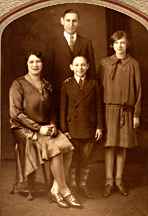| HOME |
| DESCRIPTION |
| IMMIGRANT HISTORY |
| DIRECTOR'S NOTES |
| BIO |
| REVIEWS |
| PRESS PHOTOS |
| CONTACT |
| FEEDBACK and LETTERS |
| LINKS |
|
||
|
Despite warnings to "leave him alone," "he's old," I was convinced that it wasn't too late to get to know him. Although my father was 80, I didn't feel he was too fragile to reflect on his life. From the moment the camera started rolling, my father was never more alive, alert or caring. He was honest, attentive, direct and charming. I was surprised. He was opposite to the man I grew up with, the distant and critical father. This was the man I was looking for all my life. My camera found him. Like many dads in the Fifties, my father left the nurturing of the children to his wife. Yes, he was a typical 50s dad who felt his main role was provider for the family, but his disinterest in us seemed to go beyond the cultural norms of the times. My neighbor's father played ball with his kids; my uncle picked up my cousin in his arms. I felt there was something more behind my father's distance and in that first interview discovered a family secret hidden because no one bothered to ask. My father's mother beat and kicked his sister while he and his family stood by helplessly and watched. My search to understand my father became a complex emotional genealogy. In order to understand my grandmother's violent legacy, I talked to elderly cousins, relieved to finally talk about our family secret. I thumbed through archives in Budapest and Vienna looking for images of rural Jewish life in 1900, I traveled to the village where my grandmother grew up in rural Slovakia. Standing there, I felt my grandmother's isolation. She was one of a handful of Jews in an almost entirely Catholic village. Immigrating to Cleveland in 1909 changed everything. My grandmother flourished with the freedom to make friends and to work in a man's world. Then she married. Caught between ambition and tradition, she must have felt trapped in the house. I saw this as the seed of my grandmother's uncontrollable rage, and frustration directed at her first child, her daughter. Then I followed my father through the streets of Cleveland where he grew up in order to understand him. We laughed and we talked and we thought about our lives. And we danced together, the one passion he always shared with me. I started to see my father more clearly. I started to understand that witnessing abuse can be as damaging as the blows themselves. I began to see him as a child, building a wall to keep out the guilt and fear, and in the end wondering if that wall kept me out too? Family histories can affect generations. I talked to my sister and brother for the first time about our father's emotional distance and the low self-esteem and lack of confidence we all shared. I questioned what I had learned or not learned that affected my own adult relationships and interviewed my ex-husband. He asked the first question, "Is this an ambush interview?" I responded, "Most men wouldn't do this. Why did you?" He answered, "because you asked." Then I realized that was the underlying theme of the documentary. If you ask, you might get some answers. With candor and honesty, we shared our resentments and regrets for the first time. I revealed the crippling effect of his constant criticisms and denigration and he described the pain caused by my emotional distance. I reduced eighteen years to seven minutes revealing the love, silence, and anger we shared. With charm and humor, my ex-husband realizes he is playing a part in a family drama, "Is this a Cleveland/Jewish Long Day's Journey into Night?" he asks. Like many couples, we discovered too late that we missed each other's basic needs. Long before the divorce we started to hurt each other but neither of us had the tools to stop. "Dancing with My Father," is about those tools, about how behavior is passed from generation to generation, about breaking that cycle, about not saying "it's OK." At the end of my first interview with my father I protested, "You never asked about anything in my life." He replied, "I didn't know to ask." By asking, I learned how adult love is often shaped by what a child learns at home. I understood that giving love is so simple and yet how complex. My sister was against this project when I started. She thought it would hurt my father and come between us. Recently, she called to tell me she finally heard the three words she waited 54 years to hear from my father, "I love you." My father is beginning to open up. I'm beginning to understand this thing called love. Neither of us is there yet, but love like light is a journey. |
